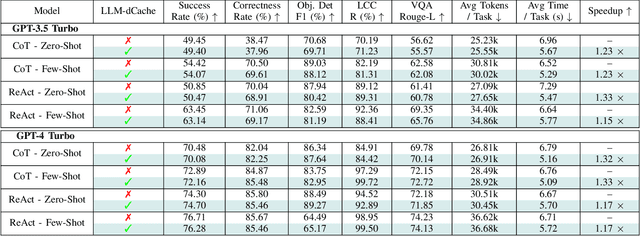Chaehong Lee
Multi-Agent Geospatial Copilots for Remote Sensing Workflows
Jan 27, 2025



Abstract:We present GeoLLM-Squad, a geospatial Copilot that introduces the novel multi-agent paradigm to remote sensing (RS) workflows. Unlike existing single-agent approaches that rely on monolithic large language models (LLM), GeoLLM-Squad separates agentic orchestration from geospatial task-solving, by delegating RS tasks to specialized sub-agents. Built on the open-source AutoGen and GeoLLM-Engine frameworks, our work enables the modular integration of diverse applications, spanning urban monitoring, forestry protection, climate analysis, and agriculture studies. Our results demonstrate that while single-agent systems struggle to scale with increasing RS task complexity, GeoLLM-Squad maintains robust performance, achieving a 17% improvement in agentic correctness over state-of-the-art baselines. Our findings highlight the potential of multi-agent AI in advancing RS workflows.
LLM-dCache: Improving Tool-Augmented LLMs with GPT-Driven Localized Data Caching
Jun 10, 2024


Abstract:As Large Language Models (LLMs) broaden their capabilities to manage thousands of API calls, they are confronted with complex data operations across vast datasets with significant overhead to the underlying system. In this work, we introduce LLM-dCache to optimize data accesses by treating cache operations as callable API functions exposed to the tool-augmented agent. We grant LLMs the autonomy to manage cache decisions via prompting, seamlessly integrating with existing function-calling mechanisms. Tested on an industry-scale massively parallel platform that spans hundreds of GPT endpoints and terabytes of imagery, our method improves Copilot times by an average of 1.24x across various LLMs and prompting techniques.
Unlearning Climate Misinformation in Large Language Models
May 29, 2024Abstract:Misinformation regarding climate change is a key roadblock in addressing one of the most serious threats to humanity. This paper investigates factual accuracy in large language models (LLMs) regarding climate information. Using true/false labeled Q&A data for fine-tuning and evaluating LLMs on climate-related claims, we compare open-source models, assessing their ability to generate truthful responses to climate change questions. We investigate the detectability of models intentionally poisoned with false climate information, finding that such poisoning may not affect the accuracy of a model's responses in other domains. Furthermore, we compare the effectiveness of unlearning algorithms, fine-tuning, and Retrieval-Augmented Generation (RAG) for factually grounding LLMs on climate change topics. Our evaluation reveals that unlearning algorithms can be effective for nuanced conceptual claims, despite previous findings suggesting their inefficacy in privacy contexts. These insights aim to guide the development of more factually reliable LLMs and highlight the need for additional work to secure LLMs against misinformation attacks.
 Add to Chrome
Add to Chrome Add to Firefox
Add to Firefox Add to Edge
Add to Edge